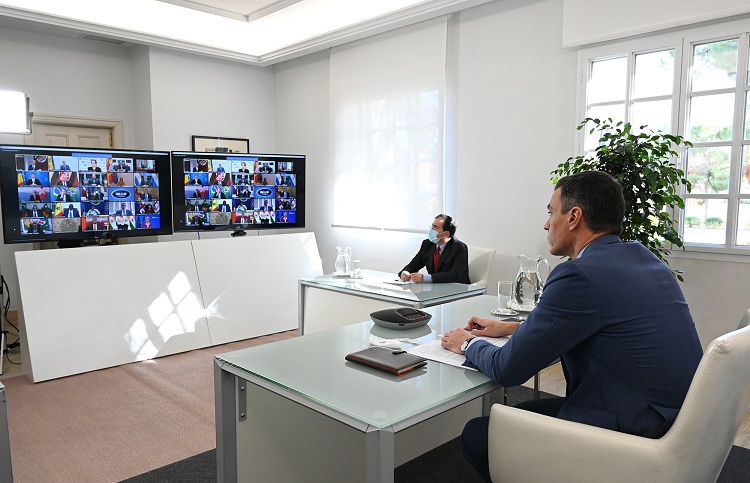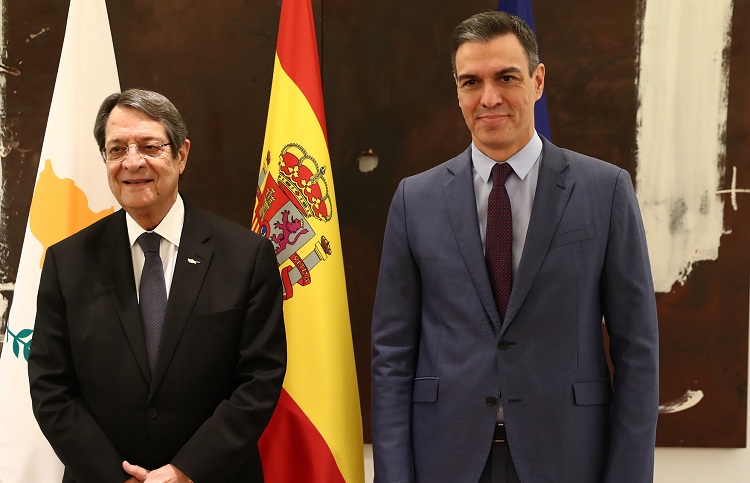The Diplomat
The President of the Government, Pedro Sánchez, warned yesterday that democracy “is a fragile and vulnerable system” that “we have the duty to care for and protect”, because “there are no racial, cultural, historical or anthropological reasons that justify the mutilation of freedom”.
The chief executive pronounced these words during his participation via videoconference in the Democracy Summit, a virtual event organized by the President of the United States, Joe Biden, with the attendance of the heads of state or government of 110 countries and leaders of international organizations, civil society and the private sector, with the objective of “establishing an agenda for democratic renewal and confronting the greatest threats facing nations”. Washington’s goal is to hold a second summit in late 2022 in person, depending on how the pandemic evolves.
The list of participants in the Summit, which will conclude today, includes the absence of a good number of countries that have not been invited by the US, such as China, Russia, Iran, North Korea, Saudi Arabia, Bangladesh, Egypt and Turkey (a NATO member). On the Latin American side, the countries invited are Mexico, Colombia, Chile, Peru, Ecuador and even Jair Bolsonaro’s Brazil. On the other hand, Venezuela, Nicaragua, Cuba, Bolivia, El Salvador, Honduras, Guatemala and Haiti are not included. Among the EU members, the only country that has not been invited is Hungary, although Poland, whose government has had major disagreements with the EU over issues related to the rule of law and human rights, has been invited. Taiwan has also been invited, which could help complicate relations with China.
“Democracy has proven to be the most effective political system to provide peace and prosperity to our societies,” said Sánchez, accompanied by Foreign Minister José Manuel Albares, during his intervention in a panel moderated by European Commission President Ursula von der Leyen. “However, in recent years we have witnessed numerous attempts to undermine our democratic systems,” warned the head of the Executive, whose intervention was broadcast live, as was that of Biden and that of “a small number of leaders,” according to Moncloa. Most of the speakers participated through a pre-recorded video.
“Democracy is threatened” by a series of “urgent challenges” that have been accelerated by the COVID-19 pandemic, said Sánchez. The main problem at the moment, he continued, is the “growing disaffection” of the citizenry towards public institutions, which leads to polarization and the rise of populism. “If we want to regain confidence in our system, we must ensure that our institutions respond to the real needs of the people,” he warned.
To do so, he continued, democracies must deliver “in terms of social inclusion” and contribute to the reduction of “existing economic and social gaps, especially now, as we have to face the ecological and digital transitions.” “As a State, we have the obligation to adopt policies with a real impact on people’s daily lives, on their salaries, on their access to housing, to universal and quality education and healthcare,” he continued.
It is also necessary to promote “political participation” of citizens, “transparency and accountability” on the part of public officials and to achieve “full and equal participation of women” in political, economic, social and cultural life, because “we cannot prosper as societies and call ourselves true democracies if we do not grant the same rights and opportunities to 100% of our population”. Another worrying challenge, she warned, is the increase in misinformation, which “undermines human rights and the quality and stability of our democracies” and fosters “the rise of hate speech on social networks.”
In the face of all these challenges, he said, “democracy is under threat.” “We need to actively defend it” because “it is a fragile and vulnerable system that cannot be taken for granted,” he continued. “We cannot forget the lessons of the past. We have a duty to protect and strengthen the legacy of generations of men and women who came before us and gave their all for democracy and freedom,” he warned. “There are no racial, cultural, historical or anthropological reasons that justify the mutilation of freedom. Democracy is not a gift we have been given, but a long and hard historical conquest that we must guard and protect,” he concluded.
Joe Biden: “Democracy needs defenders”
In the same vein, Joe Biden warned during the inaugural speech that “democracy does not happen by accident, we have to renew it every generation” and, therefore, “it needs defenders. “We in the United States know better than anyone that renewing our democracy and strengthening our democratic institutions requires constant effort,” he continued. “We must unite to reject authoritarianism,” he added.
During the Summit, the White House announced the launch of a new initiative, called The Grand International Challenges on Technologies to Affirm Democracy, which aims to “ensure that democratic values remain competitive and that democracies continue to lead the technologies of the future in the face of the challenge of asymmetries in the use of emerging technologies, which autocratic actors exploit for added value,” according to the U.S. Embassy in Spain.







